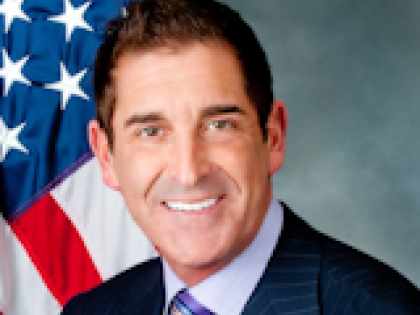
Klein And State Legislators Lead National “Terror-Free” Investment Initiative
Jeffrey D. Klein
December 3, 2007
Delaware, have written to governors and legislative leadership in all 50 states to promote their unified, ‘broad’ terror-free investing legislative model, which will apply substantial financial pressure on foreign companies to either freeze business activities within countries that sponsor terrorism, or withdraw from such countries altogether.
“This is a straightforward campaign – our constituents do not want their pension funds to support the economies of nations that sponsor terrorism, regardless of whether that support is direct or indirect,” remarked Rep. Kevin J. Murphy, a Democratic Representative from Massachusetts sponsoring the terror-free investment legislation in his state. “We have set forth a market-driven approach that applies real political and financial pressure on foreign companies to freeze operations within these countries or to withdraw, while at the same time ensuring high-yield returns completely independent of these unstable and rogue regimes.”
The legislators’ announcement follows the recent introduction of the FTSE “Terror-Free” Index Series that will streamline the “terror-free” investment process for state pension systems and other investors seeking to invest “terror-free.
and achievable.”
Investor’s Business Daily opinion editorial on terror-free investing, “That's why it was welcome news to hear that the FTSE Group, a leading global stock index, will partner with the Conflict Securities Advisory Group to provide the world's first series of indexes designed to screen out stocks doing deals in Iran, North Korea, Sudan or Syria. This free-market approach to divestment will help intensify pressure on the regimes in Tehran and Damascus, in particular, to rethink their support of terrorism.”
Unlike Iran-only divestment laws adopted by California and Florida this past summer, which require their pension funds to divest from less than 50 companies with ties to Iran’s energy sector, the “broad” legislative model will allow states to increase their financial leverage against more than 350 companies across all economic sectors by working in tandem. Specifically, the broad “terror-free” legislation proposed by Murphy, Klein, Delegate Ron George and Rep. Donald Blakey, Republican legislators from Maryland and Delaware respectively, standardizes the definition of “prohibited companies.” By so-doing, asset managers and the financial community will be able to create scalable and market-consistent “terror-free” investment products that will be available to states, institutional investors and private investors alike. This shared approach will allow states and other investors to increase their financial pressure on companies by leveraging their collective investments.
“We feel that it is time to let states know that there is a market-oriented and non-disruptive approach to this issue, one that allows states to pursue morally responsible pension investment in a fiscally sound manner to achieve the objectives of divestment as opposed to the more symbolic approach taken in other states, however well-intended it may be,” added Delegate George. “This legislation proves that morality and fiscal responsibility are not mutually exclusive.”
Rep. Blakey, author of a resolution urging his state of Delaware to divest from Sudan, has come to realize the benefits of the ‘broad’ approach. “We as legislators need to realize that the old way of thinking, one country at-a-time, one industry at-a-time, one company at a time is precisely what’s stopping this issue from becoming a national movement,” said Rep. Blakey. “If we really want to help the people of Darfur – and take a stand against state sponsorship of terrorism – it’s time for states to take advantage of the multiplier effect achieved when billions of dollars in public investments make use of a single divestment and exclusion approach.”
Unlike Iran-only divestment laws adopted by California and Florida this past summer, which require their pension funds to divest from less than 50 companies with ties to Iran’s energy sector, the “broad” legislative model will allow states to increase their financial leverage against more than 350 companies across all economic sectors by working in tandem. Specifically, the broad “terror-free” legislation proposed by Murphy, Klein, Delegate Ron George and Rep. Donald Blakey, Republican legislators from Maryland and Delaware respectively, standardizes the definition of “prohibited companies.” By so-doing, asset managers and the financial community will be able to create scalable and market-consistent “terror-free” investment products that will be available to states, institutional investors and private investors alike. This shared approach will allow states and other investors to increase their financial pressure on companies by leveraging their collective investments.
“We feel that it is time to let states know that there is a market-oriented and non-disruptive approach to this issue, one that allows states to pursue morally responsible pension investment in a fiscally sound manner to achieve the objectives of divestment as opposed to the more symbolic approach taken in other states, however well-intended it may be,” added Delegate George. “This legislation proves that morality and fiscal responsibility are not mutually exclusive.”
Rep. Blakey, author of a resolution urging his state of Delaware to divest from Sudan, has come to realize the benefits of the ‘broad’ approach. “We as legislators need to realize that the old way of thinking, one country at-a-time, one industry at-a-time, one company at a time is precisely what’s stopping this issue from becoming a national movement,” said Rep. Blakey. “If we really want to help the people of Darfur – and take a stand against state sponsorship of terrorism – it’s time for states to take advantage of the multiplier effect achieved when billions of dollars in public investments make use of a single divestment and exclusion approach.”



